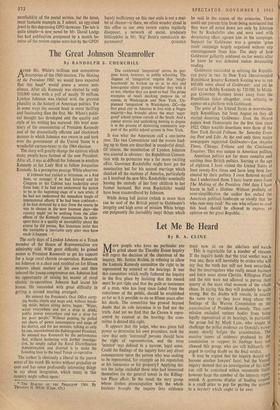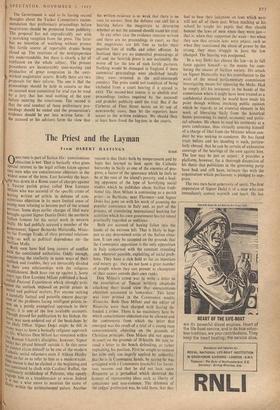Let Me Be Heard
By R. A. CLINE
MANY people who have no particular axe to grind about the Timothy Evans inquiry will regret the decision of the chairman of the inquiry, Mr. Justice Brabin, in refusing to allow the Ludovic Kennedy committee the right to be represented by counsel at the hearings. It was this committee which really fathered the inquiry in the first place by insisting that the record must be put right and that the guilt or innocence of a man, who has long since faded from the conscience of the public, should be established as far as it is possible to do so fifteen years after his death. The committee has proved beyond doubt that its sole intention is to find out the truth. And yet we find that the Crown is repre- sented by counsel at the hearing; the com- mittee is denied this right.
It appears that the judge, who was given full power to determine his own procedure, took the view that only 'interested' persons should have the right of representation, and the term `interest' was defined in a narrow, legal sense. Could the findings of the inquiry have any direct consequences upon the person who was seeking to be represented, for example on his reputation or his innocence or his property? Applying this test the judge excluded those who had interested themselves (in the general sense) in the Rilling- ton Place affair. In the result the very group whose tireless preoccupation with the whole business brought the inquiry into existence must now sit on the sidelines and watch.
This is regrettable for a number of reasons. If the inquiry holds that 'the trial verdict was a true one, there will inevitably be critics who will say that the truth has still not been unearthed, that the interrogators who really meant business and knew most about Christie, Rillington Place and the rest were not allowed to pursue their quarry at the most vital moment of the whole chase. In saying this they will probably be quite wrong. But the doubts will remain, in exactly the same way as they have hung about the findings of the Warren Commission on the assassination of President Kennedy. That com- mission excluded various bodies from being legally represented at its hearings, in particular the group led by Mark Lane, who sought to challenge the police evidence on Oswald's move. ments shortly befgre the assassination. The massive' tomes of evidence produced by the commission to support its findings have not silenced this group, who are still fnilitantly en' gaged in casting doubt on the final verdict. It may be argued that the inquiry should not become another lawyers' feast; but the Vassal! inquiry showed that an investigation of this kind still be contained .within reasonable 1411° however large the number of the interests repre- sented. A generous display of leading counsel is a small price to pay for putting the quietus to a mystery which ought to be over.
The Government is said to be having second thoughts about the Tucker Committee's recom- mendation that preliminary proceedings before magistrates should be protected from publicity. The proposal has not unpredictably met with a scorching reception from the press. The latter has no intention of watching without protest this fertile source of reportable drama being closed up. The reactions of the newspapermen are understandable, but there is clearly a lot of confusion on the whole subject. The present procedures are incontestably time-wasting and productive of great congestion in the over- worked magistrates' courts. Briefly there are two proposals for their reform. The one is that the proceedings should be held in camera so that an accused man committed for trial can be tried by a jury that has read nothing of the case before entering the courtroom. The second is that the oral conduct of these preliminary pro- ceedings should be ended and the prosecution's evidence should be put into written form: if the accused or his advisers form the view that the written evidence is so weak that there is no case to answer, then the defence can call for a hearing before the magistrate to determine whether or not the accused should stand his trial.
In any other case the evidence remains written and there are no proceedings in court, so that the magistrates are left free to tackle their massive lists of traffic and other offences. In Scotland there are no committal proceedings at all and the Scottish press is not noticeably the worse off for the loss of such fertile pastures. Nothing would be damaged in England if these committal proceedings were abolished totally (they were invented in the mid-nineteenth century). The press could not complain of being excluded from a court hearing if it ceased to exist. The second-best course is to abolish oral proceedings (unless required by the accused) and prohibit publicity until the trial. But if the Cerberus of Fleet Street insists on its sop of newsworthy cases, then let the reporters have access to the written evidence. We should then at least have freed the log-jam in the courts.







































 Previous page
Previous page